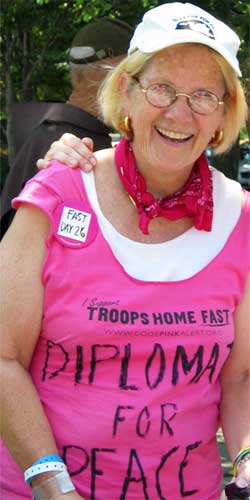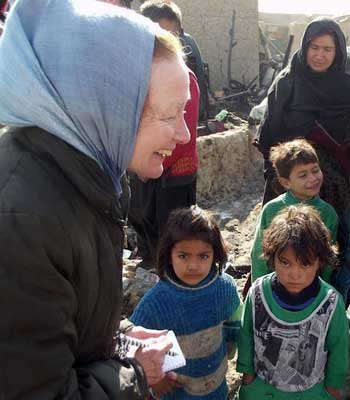Three well-known international peace activists will share their experience with international civil rights crises, including the U.S. government’s use of drones, at 7 p.m. Thursday, March 20, in the Regency Room of the Holmes Student Center.
The panel discussion, “Three Women Who Stand for Peace: International Civil Rights in the Age of Drones,” is one of many civil rights events on campus during Women’s History Month, sponsored by the NIU Women’s Studies Program and other university and community groups.
Peace activist and retired Army Col. Ann Wright plans to talk about the impact of U.S. foreign and war policies on women and children around the world. Wright, who served 29 years in the Army and 16 years as a U.S. diplomat, retired from government service in 2003 in opposition to the Iraq War.
Her recent work has focused on alerting the American public about assassin drones used by the U.S. government. Some of her peace efforts have taken her to Afghanistan, Pakistan and Yemen, Wright said, where she has met with families of drone victims.
Another human rights issue that she speaks on is government infiltration of citizens’ cell phones, emails and other private communications. Eavesdropping breaches have mounted since the attacks of Sept. 11, 2001, and the Patriot Act, Wright said.
“I do a lot of speaking about the need to protect the privacy that is our right by the Constitution and challenge our government on what I believe are these illegal programs of spying on American citizens,” she said.
She has also led the way to open discussions on sexual assault in the military.
“One in three women is sexually assaulted or raped during the time that she’s in the military,” she said, adding that most sexual assault cases don’t make it to trial, whether the victim is a woman or man.
Wright added that she was never sexually assaulted, but views sexual harassment as a problem for all military women.
Medea Benjamin, founder and director of the peace group Code Pink, also campaigns against the use of killer drones. She organized the first-ever international drone summit and led delegations to Pakistan and Yemen to meet with drone strike victims and family members of Guantanamo Bay prisoners. More information about drones is found in her book, “Drone Warfare: Killing by Remote Control.”
“Our campaign against killer drones has helped shift public opinion and force the government to reduce the number of drone strikes,” Benjamin said.
Code Pink has recently focused on ending U.S. warfare in the Middle East and cutting the military budget.
Like Wright, Benjamin supports helping women and their families around the globe and finding nonviolent solutions to conflicts rather than using militarization.
While the women of each culture live differently, she said, their commonality is trying “to keep themselves and their families fed, healthy and safe.”
“If you’re a poor woman in the United States, your biggest problem might be finding a decent school for your child, an environment free from violence and a job that pays enough to help support your family,” Benjamin said. “If you’re a woman in rural Africa, your biggest problem might be finding clean drinking water and growing food in the midst of severe drought caused in part by climate change.”
Kathy Kelly, co-coordinator of Voices for Creative Nonviolence and a two-time Nobel Peace Prize nominee, will also be on the panel.
Kelly, who visited NIU last year to talk about her visits to Syria and the Gaza Strip, plans to address the violation of basic human rights of the Afghan people and her expectations that the U.S. military presence is likely to continue in Afghanistan.
While her organization has concentrated on helping Afghanistan and Iraq, it has been involved in peace campaigns and education efforts around the world.
“Mainstream education may not always provide the kind of education many impoverished women need most,” Kelly said. “I just returned from visiting Barefoot College in India, where grandmothers are learning to become solar engineers, accountants, dentists and water conservation experts … even if they are not yet literate.”
Barefoot College is a nongovernmental organization that provides basic services and solutions in rural communities, with the goal of making them self-sufficient and sustainable.
Besides human rights violations, the women plan to discuss how to build an activist community to address global concerns.
The panel discussion is free and open to the public. For more information, (815) 753-1038 or email womenst@niu.edu.



